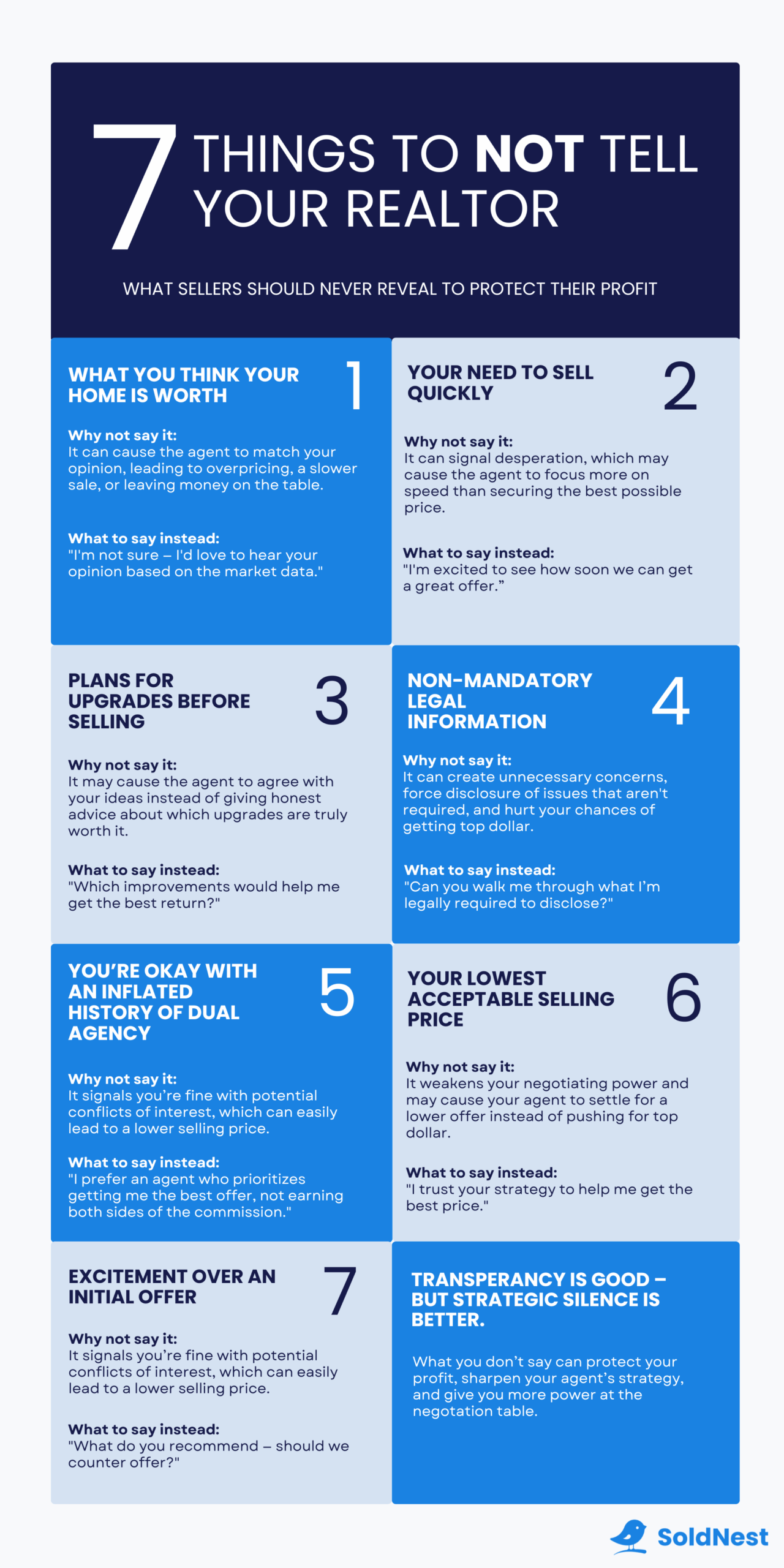Open communication with your real estate agent is instrumental to successfully selling your home.
But your conversations need to be a balancing act between transparency and strategic discretion.
Why?
Because while openness builds trust, over-disclosure can work against you, turning your honesty into a tactical disadvantage.
That’s why it’s not just about what you tell your Realtor; it’s also about what you don’t.
And understanding what you should refrain from saying when asking important interview questions can significantly change the outcome of your home sale.
Here are the 7 most important things to not tell your Realtor when selling.
1. What you think your home is worth
It’s common for a Realtor to inquire about what you think the value of your home is.
This typically happens before you interview a potential agent — but can also happen during your initial face-to-face conversation.
Your urge to respond with your price opinion can be powerful.
But you should hold back.
Here’s why…
A Realtor knows that you’re more likely to hire them if their suggested list price matches your opinion.
So you’ll inadvertently invite the Realtor to tweak their price recommendation by telling them what you think your house is worth.
That’s something bad real estate agents are quick to exploit.
It’s an open invitation for them to over or underprice your home, which can harm your selling position.
Pricing your property too low potentially forfeits additional profit for you.
Meanwhile, overpricing it drastically increases the chances of your listing sitting on the market.
So, how should you respond?
Show humility.
Admit you’re unsure and keen to hear an opinion from a real estate expert.
Ultimately, you’ll get a more accurate and objective list price recommendation if you don’t tell a real estate agent what you think your house is worth.
2. Your need to sell quickly
Transparency is key to the Realtor-seller relationship.
But divulging that you need to sell your house fast doesn’t need to be a part of that.
Maybe you can no longer afford the cost of living in your home, or maybe you’re just eager to move on.
You should avoid telling a real estate agent these specific details.
Most agents will read this as desperation, which can affect their strategy to get the best possible price.
Instead of telling a Realtor about your desire to sell quickly, you can mention something subtle such as, “I’m excited to see how soon we can get a great offer.”
Or you can even inquire about how long they think it will take them to sell for top dollar.
Both of these examples let a Realtor know that selling quickly is top of mind for you — but so is getting the best price.
Remember, selling your home is a business transaction.
You’re not obligated to disclose every single detail of your personal circumstances.
Keep your financial cards or anxiety about selling quickly close to your chest.
What matters most is maintaining a professional relationship focused on not only selling your house in the shortest possible amount of time, but also for the highest price.
3. Plans for upgrades before selling
Planning on making upgrades to your home before selling?
That can be a smart move.
But exposing these plans to your real estate agent isn’t.
Here’s why…
Revealing your home improvement plans can be an enticing proposition for a prospective listing agent.
It signals a commitment to making the property more marketable, which could potentially lead to a quicker sale.
However, it doesn’t mean those upgrades are worth making.
Some home improvements offer a higher return on investment (ROI) than others.
But a Realtor might agree with your plans, even if it means you’ll spend more money and time than you should.
Hold back from saying which improvements you have in mind when you meet with a Realtor for the first time.
Instead, request their professional opinion.
An experienced agent in your area is familiar with buyer preferences — so they’ll know which improvements will yield the best return on your investment when selling.
This will enable you to get unbiased recommendations that will increase your net profit.
4. Non-mandatory legal information about your property
You’re obligated to disclose certain legal information to prospective buyers when selling your home.
This generally means anything that can affect the property’s value or the buyer’s use and enjoyment of it.
But what about non-mandatory details?
It’s best you keep them to yourself.
Because revealing too much information might work against your best interests.
You’ll unintentionally create concerns where none exist if you share non-mandatory legal details.
It might give your Realtor the impression that there are more potential issues with the property than there actually are.
And the last thing you want is a listing agent whose enthusiasm and selling strategy are negatively impacted.
Plus, your Realtor is required to disclose any information you tell them about your property.
This means you’ll also risk reducing the number of interested buyers, which can impact your selling price.
So don’t reveal any legal information about your property that isn’t necessary.
Instead, let your Realtor guide you through the process on what needs to be disclosed.
They’ll provide you with the required selling disclosures in your area and can deliver expert advice.
That’s part of your listing agent’s responsibility.
5. You’re okay with an inflated history of dual agency
Dual agency is when a Realtor represents both the seller and buyer in the same transaction.
It might seem efficient, but a dual agent can easily compromise your best interests.
How?
Because a Realtor is inclined to prioritize earning two commissions from a single transaction over getting you the best deal.
Which is why persuading a seller to accept their buyer’s offer is one of the tricks some real estate agents play.
They’re tasked with securing the highest price for you, the seller, while simultaneously trying to get the lowest price for the buyer.
It’s a balancing act that is nearly impossible and often results in a lower selling price.
Unfortunately, most sellers aren’t aware of their agent’s history of acting as a dual agent.
Real estate agents will often highlight the number of homes they’ve sold — but rarely mention how often they also represented the buyer.
That’s why knowing about an agent’s history of acting as a dual agent is key.
It tells you a lot about their character and integrity.
For many areas, the average percentage of dual agency sales for an experienced listing agent hovers between 10 and 12%.
So if an agent’s dual agency percentage is higher than 12%, do not tell them you’re okay with it.
Instead, express your preference for a real estate agent who has a track record of advocating for a seller’s interests.
This is why analyzing a listing agent’s dual agency rate is baked into our screening process.
We’ll never match a home seller with a local agent whose track record indicates they prioritize earning two commissions from a single listing.
6. Your lowest acceptable selling price
You might have a number in mind that meets your minimum acceptable selling price.
Don’t say this to your real estate agent up front.
Because giving away your bottom line price can shrink your negotiating power.
Imagine if a buyer’s offer is close to your minimum.
Your Realtor might urge you to take it if they already know it meets your price requirements.
But your agent’s job is to get you top dollar, not just reach your rock-bottom number.
They should incorporate negotiating tactics that contribute to the best selling price and terms.
Revealing your minimum acceptable selling price up front will reduce the chances of this happening.
Instead, keep that number to yourself until an offer lands on the table.
What if your Realtor urges you to tell them a number before you get an offer?
Keep it vague and encourage them to “aim high.”
Let them know you trust their expertise to negotiate the best price.
7. Excitement over an initial offer
Receiving the first offer for your house will be a thrilling moment.
It’s going to feel like a monkey is off your back.
But don’t express this excitement to your real estate agent.
Your emotional reaction could signal that you’re satisfied with the buyer’s initial offer.
This can steer your Realtor away from advising you to counter offer a better price or more favorable terms.
A buyer’s first offer is often just the starting point of a negotiation, not necessarily their best or final offer.
So you might accidentally dissuade your Realtor from engaging in this crucial part of the home selling process.
Do this instead…
Put on a poker face and remain neutral when discussing the offer with your real estate agent.
Even if it’s a price that’s higher than you thought you would get.
Request their advice on whether they think it’s worth counter offering.
Listen to their response and game plan together on the best approach.
Keeping your emotions in check will keep the negotiating channels open and could lead to a better deal for you.
The final word
Navigating the seller-Realtor dance can be complex, but knowing what to avoid saying is crucial.
Yes, transparency is key — but so is strategic secrecy.
Keeping certain information close to your chest ensures a better outcome for the sale of your home.
It maximizes your potential for profit, ensures your Realtor focuses on obtaining the highest sale price, and aids in maintaining your negotiation power.
Ready to engage in a conversation with a prospective listing agent?
It’s not easy knowing which agents might compromise your sale price.
That’s where our no-cost service can do the homework for you.
We analyze unique agent criteria and online reviews to match sellers with top local agents who have a proven track record of putting their clients first.
You can learn more about how it works here.



